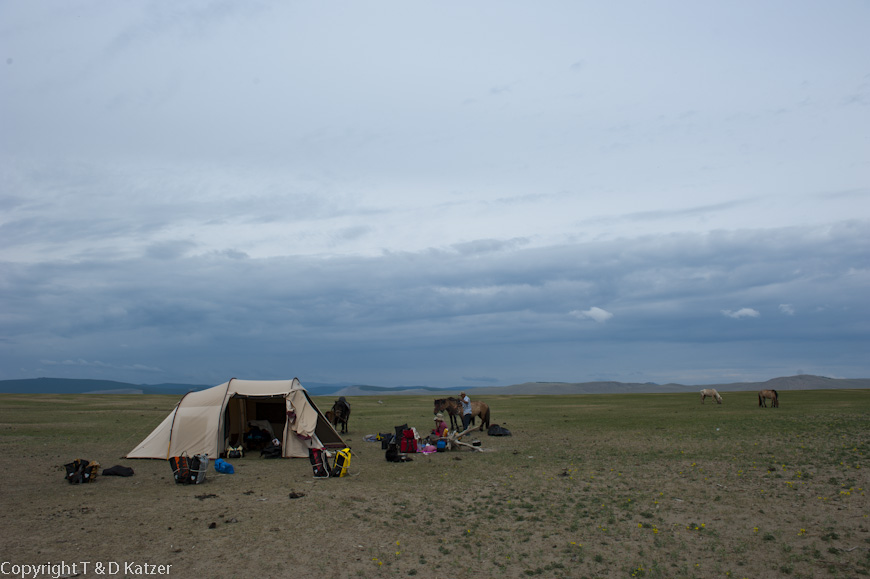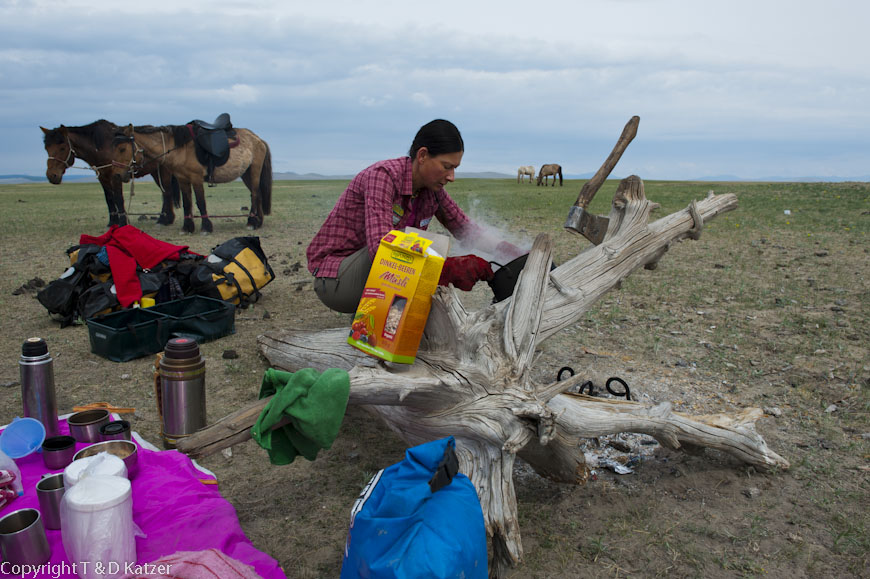
The Prince
N 51°06'521'' E 099°40'726''
Day: 329
Sunrise:
05:05
Sunset:
21:38
As the crow flies:
19,02
Daily kilometers:
23
Total kilometers:
1469
Soil condition:
Grass
Temperature – Day (maximum):
17 °C
Temperature – day (minimum):
14 °C
Temperature – Night:
5 °C
Latitude:
51°06’521”
Longitude:
099°40’726”
Maximum height:
1539 m above sea level


Today we are loading again with my lacing technique, much to the displeasure of our horseman. As we set off, the mood is subdued. Threatening-looking clouds gather over the nearby Khoridol-Saridag mountain range at the foot of which the village lies. The wind comes up again and blows towards us with considerable force. “It’s going to rain soon,” I say to Tanja.
We stop five kilometers before Ringinlhumbe. “Where does your family live?” I ask Odonbaatar to make sure I don’t have to make another detour. “Outside Ringinlhumbe,” he replies sullenly. “Okay. How far out?” I add. “About eight kilometers.” “Eight kilometers? That means if we want to stock up on supplies, we have to ride eight kilometers in and eight kilometers out. That’s 16 kilometers just to buy a few groceries. And if we want to continue riding tomorrow, we have to ride the eight kilometers back again because the path goes over the mountains on the other side of the village. Is that right?” I ask calmly. “Tijmee,” he replies. “This time he wants to make us take a detour of 24 kilometers,” I say. “We don’t have to go to the village because of me. We have enough food. It’s just about Odonbaatar’s meat supply,” explains Tanja. “A Mongol without meat and fat goes crazy after a few days. That means if we don’t ride into town, we’ll have an even bigger problem in the foreseeable future.” “On the other hand, from here we could turn directly into the gorge we came out of last year with Bilgee. From there it’s only three days’ riding to Khvsgol Nuur (Khovsgol Lake). If we take this route, we can save ourselves the hassle of riding back and forth,” I think aloud. “I need Mongolian food. Besides, it’s going to rain heavily at any moment. What’s more, the route through the gorge is a detour. There’s a shortcut over the mountains,” our man laments. “You only ate Mongolian food with your friends last night and this morning,” says Tanja, whereupon Odonbaatar starts shouting. “He’s like a little child and wants to go home. If we turn off towards the valley now, we’ll create a fuss here that we don’t need. Our horses are tired and urgently need water. Odonbaatar says there is none in the valley. That’s not true, because I can remember crossing a frozen river ten to 15 times last year, but we might not reach it today,” I muse. “So what do you think we should do?” asks Tanja wearily. “I don’t know,” I reply, stressed by the situation. “My sister lives on the other side of Ringinlhumbe. We can go and see her today,” Odonbaatar suggests as if he has understood our conversation. “Okay. Let’s march to your sister. Tomorrow you’ll lead us over the mountains,” I reply without further ado.
Tired, we reach Odonbaatar’s sister’s log cabin after a five-hour walk. A somewhat cowardly Mongolian opens the rickety wooden gate to his large courtyard which, like all properties in the small towns and villages in this part of Mongolia, is surrounded by a two-meter high wooden fence. Speaking loudly, he helps us unload the horses. To prevent them from eating his lawn, he immediately ties the animals to the fence. “And I thought they could feast on the lush greenery here,” I say, a little disappointed. We are immediately asked to enter the baishin. Hot milk tea is served. “My sister is a gynecologist at the local hospital and is currently at work,” explains Odonbaatar, suddenly in a good mood again.
“Do you like meat?” Odonbaatar’s brother-in-law asks me. “Only if it’s not fat,” I reply. “Not fat? Fat is the best part of meat,” he replies. “I’m not so good at it,” I say. “No shit. You’re not a man. Fat is very good for me,” he boasts and strokes his bulging belly with his right hand several times with relish.
“Can you get me a pack of cigarettes from the store?” Odonbaatar asks me. “What should I do?” I ask, because I think I’ve misheard. “I’d like to smoke and I need cigarettes.” “Well, get some yourself,” I reply as kindly as possible. Odonbaatar digs out his wallet and pulls out a few bills which he hands to his nephew, who is about 13 years old. He immediately goes to get the cigarettes. “Stop!” Tanja suddenly yells, jumping up from her seat so that a bowl of tea clatters to the floor and dashes outside as if stung by a tarantula. Everyone present, including myself, is frozen with shock at Tanja’s outburst. Through the window I can see Odonbaatar’s nephew about to lead Tenger out of the courtyard. “Bring the horse back immediately and tie it to the post again!” Tanja shouts at the boy. He also freezes for a few seconds in shock. Then he brings the horse back. Tanja comes back into the baishin in a rage and glares at Odonbaatar. “You can’t just borrow our horse without asking me or Denis. Our horses are tired and aren’t used for a quick cigarette. Is that clear?” Odonabaatar’s grin petrifies. Then he nods. “Stay calm. We don’t want to cause any problems here,” I try to reassure Tanja. “What a damned impertinence. This lazy person wants to send you out for cigarettes. That’s the bottom of the barrel. And then he just lends out our Tenger like that. What does this wretch think he’s doing?” she curses loudly. “That’s all right. You’re absolutely right. But we’re still in Mongolia. Different customs prevail here,” I say. “Here, too, you don’t just send your employer to fetch cigarettes and, above all, you don’t lend out other people’s horses,” she snorts angrily. “That’s right. But we’ve only just arrived with this family. The people here can’t help our stupid horse man,” I say as calmly as possible. In the meantime, the boy is off without his horse to get the staples.
After a few minutes, the dust has settled. “Your horses must go out to pasture,” Odonbaatar’s mother kindly admonishes us. “Yes, we know. Your son is responsible for that,” Tanja replies in a friendly manner. The mother immediately begins to scold her son. He slowly rises to take the horses to the nearby pasture on the edge of town. “I’ll go with him,” says Tanja and leaves the Baishin with him. It doesn’t take long and Odonbaatar is back. “Where is Tanja?” I ask. “With the horses,” he replies. “And when are you leaving?” “In half an hour. After dinner.” “Okay,” I agree, assuming that he will be spending the night with the horses and will need to fortify himself first.
In the meantime, I had the opportunity to speak to Odonbaatar’s older brother on the phone. “I’ll take care of it. Yes, I’ll talk to him. He’ll do his job properly,” promises Boldor, who has been a tour guide for many years.
After an hour, our tent is pitched on the green grass in the family’s courtyard. The equipment is packed away and the sleeping mats inflated. I look at my watch and wonder where Tanja is. When I go back into the baishin to ask how much longer Odonbaatar wants Tanja to sit out there, the prince is washing his shirt. “Tanja is in the pasture and is freezing. She hasn’t eaten since this morning and is completely soaked from the rain. When are you going to relieve her?” “In a minute,” he replies. As I don’t know where the pasture is, I can’t relieve Tanja. That’s the reason why I always have to talk to Odonbaatar.
Apparently ignoring his older brother’s instructions, an hour later the prince washes his body in a large bowl of hot water. Because Tanja and I haven’t been able to clean ourselves with so much warm water for over ten months and our prince has only been away from home for a week, I can feel a volcanic eruption brewing inside me. “Tanja has been with the horses for 2 ½ hours now and you’re washing yourself unabashedly, cleaning your shirt and stuffing your stomach. When are you finally going to leave and take over your job?” I ask again as calmly as possible. “Right away,” he replies. Before he leaves the log cabin, his old mother gives him a new T-shirt so that our man looks as good as new. Then he moves leisurely out of the hut.
Tanja returns at 10 p.m., frozen, shivering and with blue lips. In the meantime, I have filled the thermos flasks with hot water and bought a beer and sweets. Tanja gets hungry and puts on dry clothes. “What an idiot,” she curses indignantly. “He is,” I agree with her. “Cheers,” I say. Here’s to a hopefully better onward journey,” I say, holding my cup out to her.
“Denis? My brother needs the headlamp, his raincoat and the sleeping mat,” demands Odonbaatar’s sister, unzipping our tent. “Well, let him get the things then,” I reply. “Will you take them to him? He doesn’t want to leave the horses alone,” she replies, not responding to me. “It can’t be that he suddenly cares about our horses,” says Tanja. “Who knows? Maybe his mother has talked him into it and his brother’s words are bearing fruit after all,” I reply. After Tanja has explained the way to me, I set off and bring the things to our husband.
Back in the tent, Tanja says, “In your absence, Odonbaatar’s mother was here and asked if you had really brought him what he wanted. She seems to be very worried about him.” “No wonder. He’s the youngest son. They’re always pampered in Mongolia. Maybe that’s the reason for his rude and spoiled behavior,” I ponder.
It rains all night. Tanja gets up at 4:00 a.m. and runs to the pasture. Since we don’t trust Odonbaatar one inch more, she wants to check whether he really spends the night with the horses and guards them from theft with his presence.
We look forward to your comments!

